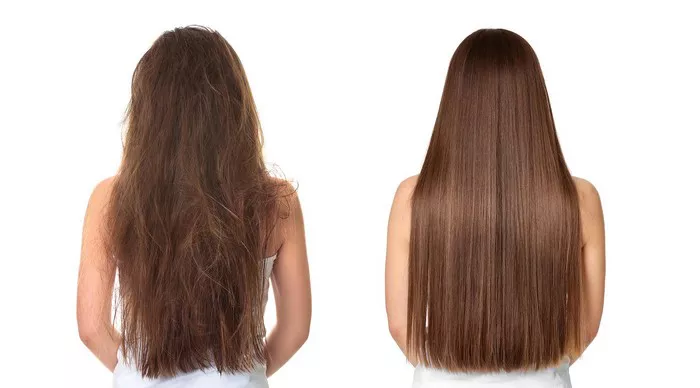Permanent hair straightening, also known as chemical straightening, is a process that alters the structure of your hair to give it a straight, smooth texture. It involves breaking down the hair’s natural bonds using chemicals and then restructuring them in a straight pattern. While this process offers long-lasting results, it also requires a dedicated aftercare routine to maintain hair health and appearance.
1. Immediate Post-Treatment Care
Avoid Washing Your Hair Immediately
After getting your hair permanently straightened, it is crucial to avoid washing your hair for at least 72 hours. This allows the chemicals to fully settle and prevents your hair from reverting to its natural state.
Minimize Touching and Styling
For the first few days, avoid tying, tucking, or excessively touching your hair. This helps to maintain the newly achieved straight texture and prevents any dents or creases from forming.
Use the Right Products
Switch to shampoos and conditioners specifically formulated for chemically treated hair. These products are gentle and help maintain the integrity of your straightened hair.
2. Establishing a Long-Term Hair Care Routine
Washing Your Hair
Frequency: Limit washing your hair to 2-3 times a week to prevent stripping away natural oils that keep your hair moisturized and healthy.
Product Choice: Use sulfate-free shampoos and conditioners. Sulfates can be harsh and strip away the necessary moisture, leading to dryness and damage.
Deep Conditioning
Regular Treatments: Incorporate deep conditioning treatments into your routine at least once a week. These treatments help replenish moisture and repair any damage caused by the chemical process.
DIY Masks: You can also use homemade hair masks made from natural ingredients like honey, avocado, and olive oil to nourish and strengthen your hair.
Leave-In Conditioners and Serums
Use leave-in conditioners and serums to add an extra layer of protection and hydration. Look for products with ingredients like argan oil, keratin, and silicone, which help to smooth the hair cuticle and add shine.
3. Protecting Your Hair
Heat Protection
Minimize Heat Styling: Limit the use of heat styling tools such as flat irons, curling irons, and blow dryers. If you must use them, always apply a heat protectant spray or serum to minimize damage.
Air Drying: Whenever possible, allow your hair to air dry naturally. If you need to use a blow dryer, use it on a cool or low heat setting.
Sun Protection
Cover Up: Prolonged exposure to the sun can damage your hair and fade its color. Wear a hat or use a UV protection spray when you’re outdoors for extended periods.
Avoid Chlorine and Salt Water: Chlorine and salt water can be harsh on chemically treated hair. If you’re swimming, wear a swim cap or apply a protective leave-in conditioner before getting into the water.
4. Maintaining Hair Health
Regular Trims
Get regular trims every 6-8 weeks to remove split ends and keep your hair looking healthy and neat. This also prevents further damage and promotes growth.
Healthy Diet
Your diet plays a significant role in the health of your hair. Ensure you consume a balanced diet rich in vitamins and minerals, especially biotin, vitamin E, omega-3 fatty acids, and proteins, which are essential for healthy hair growth.
Stay Hydrated
Drink plenty of water to keep your body and hair hydrated. Hydrated hair is less prone to dryness and breakage.
See Also: What Does Neo Hair Lotion Do: A Beginner’s Guide
5. Common Mistakes to Avoid
Over-Washing
Over-washing can strip your hair of natural oils, leading to dryness and frizz. Stick to washing your hair 2-3 times a week.
Using Harsh Chemicals
Avoid using harsh chemicals like bleach or hair dyes soon after getting your hair straightened. These chemicals can further weaken your hair and cause significant damage.
Neglecting Scalp Care
A healthy scalp is crucial for healthy hair. Use gentle scalp massages and natural oils to keep your scalp moisturized and free from dandruff.
6. Professional Treatments
Keratin Treatments
Keratin treatments can help maintain the straight texture and add a protective layer to your hair, making it smoother and shinier. Consult your hairstylist about the right timing for such treatments post-straightening.
Olaplex Treatments
Olaplex treatments help to repair and strengthen hair from within. They are particularly beneficial for chemically treated hair, restoring its strength and preventing further damage.
Conclusion
Caring for your hair after permanent straightening involves a combination of proper washing techniques, using the right products, and protecting your hair from damage. By following these guidelines, you can enjoy sleek, straight hair while maintaining its health and vitality.
Remember, your hair’s needs may vary based on its unique characteristics and the specific straightening method used. Consult with your hairstylist for personalized advice and recommendations to keep your hair looking its best.


